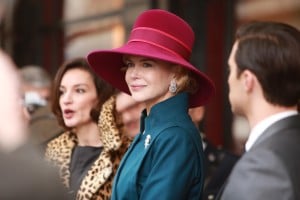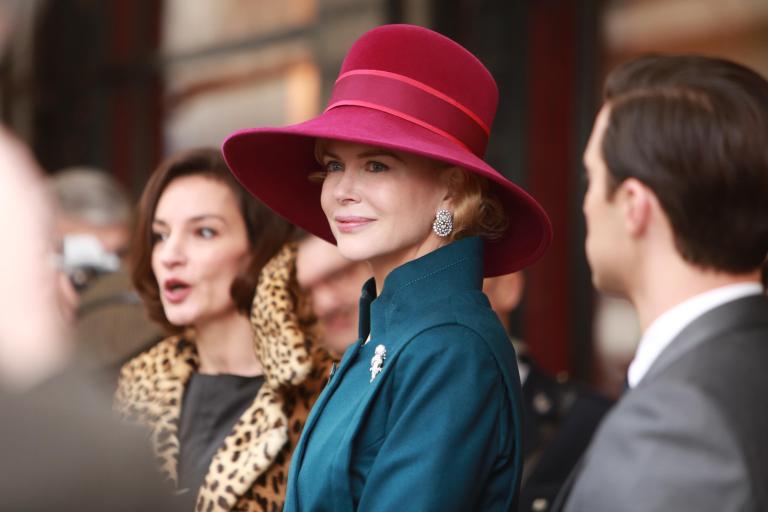
What better way to inaugurate the very exclusive 67th Cannes Film Festival than with “Grace of Monaco,” a film that fails so spectacularly you wonder what it’s even doing on the program? Then again, this is the festival that rewarded the unwatchable “Uncle Boonmee Who Can Recall His Past Lives” with its top prize, the Palme d’Or, not too long ago.
At about the 30-minute mark in the second press screening of the film, there was a sudden eruption of laughter from the audience, no longer able to contain its mockery: Director Olivier Dahan was aimlessly aiming his shaky camera at a long close-up of Grace’s (Nicole Kidman) eyes, as she bemoans what a sad lot it is to be the Princess of a silly nation.
Everything about this melodrama screams ‘B’ movie, but it makes the mistake of taking itself seriously, as if this could possibly be high art, rather than relishing in its own preposterousness. From the mustache-twirling Royal family— the Prince (Tim Roth) is always smoking a cigarette— to the uptight royal assistant (Parker Posey) to the fact that it asks us to take seriously both Monegasque politics and whether Princess Grace had the right to cut her hair short. Perhaps Dahan was too focused on finding a way to make the very tall Kidman not look like she’s completely towering over the very small Roth.
When the film begins, Princess Grace is moping about how her royal status prevents her from being herself. Mr Hitchock pays a visit to the palace to tempt her back into the movies, and she seriously considers it. But when she realizes it’s her duty to stay in Monaco, in a Andy-Sachs-Devil-Wears-Prada-esque epiphany, she decides to prepare to play the greatest role of her life: to really give being her all to being a Princess. And she’s got Derek Jacobi, who you would think would have better things to do with his time, to coach her through it all. Once she learns to play the part of the doting, pretty wife, she even takes on politics, becoming the unlikely savior of a hopelessly antiquated monarchy: she wins the world over with a vapid speech at a party, preventing France from annexing its protectorate.
There could have been a good film here, if the script expanded on its shallow parallels between what it means to be American Hollywood royalty and European royalty— and how Grace straddled both worlds. It could have taken a page out of the “Gossip Girl” playbook, which had its own ill-advised Blair Waldorf Princess of Monaco storyline, which at least dealt with the “Mad Men”-esque issues of how we all play parts in our lives, and we can get into trouble when we prioritize our image of ourselves over authenticity. Or it could have gone in the complete opposite direction, reveling in the camp that the film is so unconsciously full of, from the milky white light pouring into all the windows to the lingering melancholic close-ups, to strike a tone more like “Moulin Rouge.” Instead, there’s an inchoate script with horrifically bad dialogue and over-the-top performances by talented actors doing bad accents.
Although the Opening Night Film at the Cannes Film Festival has always been a star-studded affair, gone are the days when excellent films that didn’t need the exposure, like “Midnight in Paris” or “Moonrise Kingdom,” got the spotlight. Lately, the only criterion seems to be that the film must be all about glitz and glamour, not unlike this festival: at least at the Toronto International Film Festival, the stars get dressed up to head to the premieres with lay audiences. Last year’s effort, Baz Luhrmann’s mediocre “The Great Gatsby” at least had some redeeming qualities, but the all-star cast and Grace’s very chic outfits hardly make it even worthwhile to spend two hours of your life on “Grace of Monaco.”
Meanwhile, other major film festivals have been putting in more effort to make the Opening Night film count. “Whiplash” opened Sundance in January and it has received a coveted spot at the Director’s Fortnight at this year’s Cannes. “The Fifth Estate,” at minimum a showcase for the up-and-coming Benedict Cumberbatch, and Jim Jarmusch’s fantastic “Only Lovers Left Alive” opened the Toronto International Film Festival last fall. The lackluster choices at Cannes suggest that this is still a festival caught in the past, hardly a surprise considering almost all the spots in the Official Competition go to festival frequenters and favorites.
Contact Alexandra Heeney at arts “at” stanforddaily.com.
